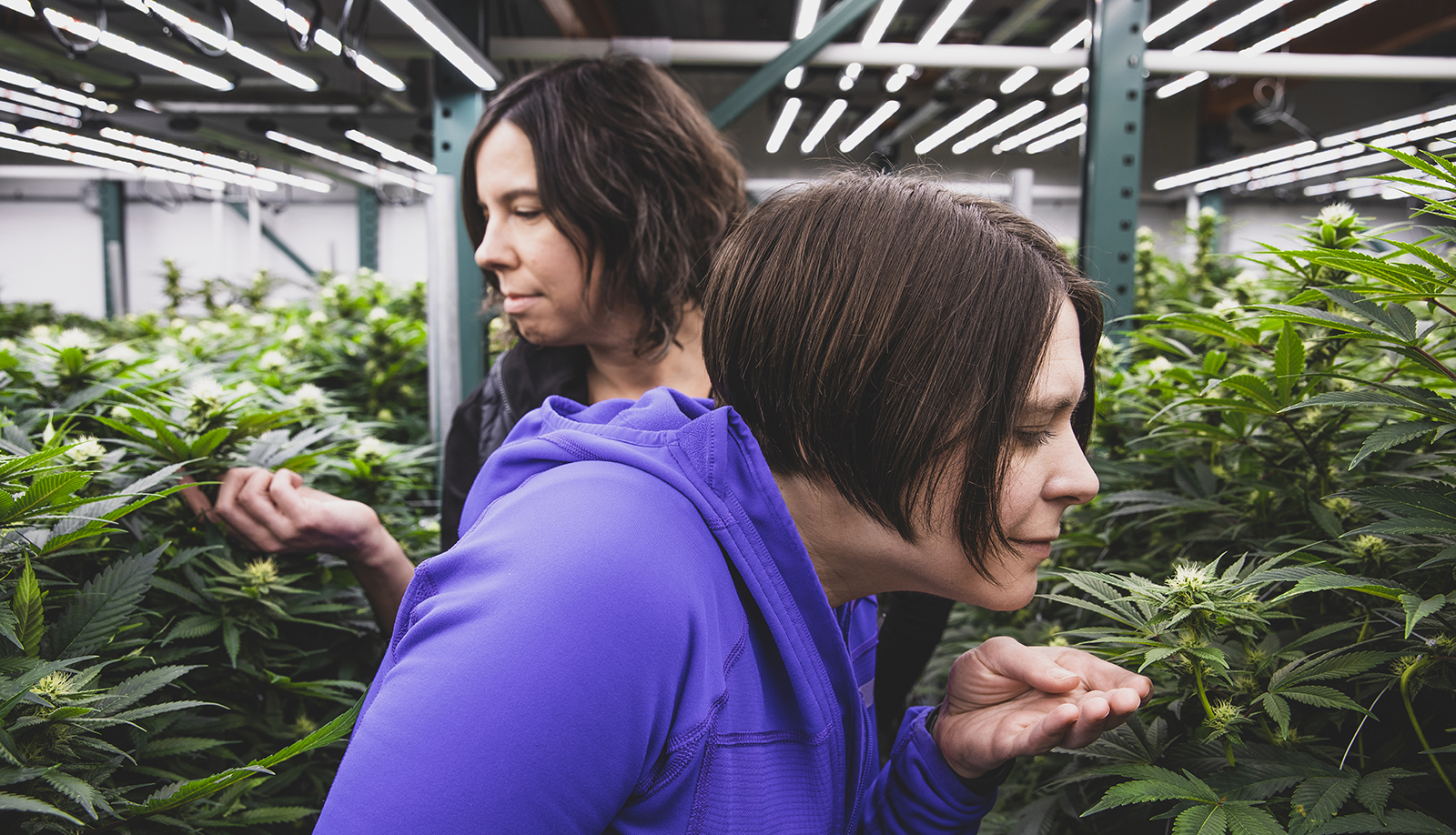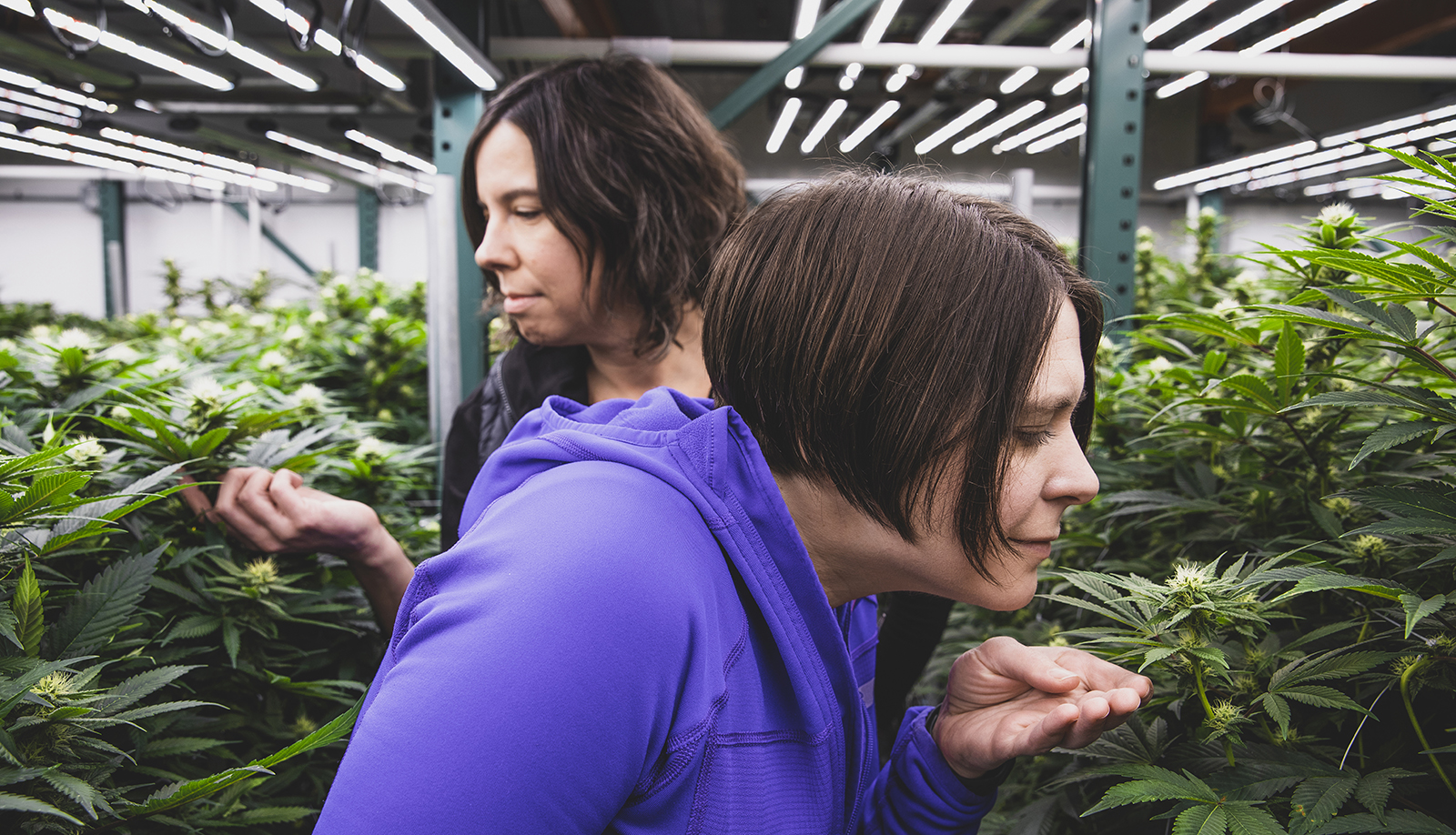
All eyes are on the LGBTQ community during Pride month. June often becomes full of fabulous celebrations, “woke” marketing tactics, and sometimes difficult discussions about LGBTQ rights, representation, equality, and advocacy.
Weedmaps News sat down with four cannabis industry leaders — Christine De La Rosa, co-founder of The People’s Dispensary in Oakland, California; Leon Mostovoy, founder of Wings of Wellness and co-founder of Pride Wellness in Los Angeles; Buck Angel, co-founder of Pride Wellness; and Katie Stem, co-founder of Peak Extracts — who identify as members of the LGBTQ community to ask them where they see the LGBTQ community’s place in weed culture at large.
The roundtable of business owners help dissect the effective ways that advocacy and protest history for LGBTQ rights and cannabis legality are interwoven, as well as how consumers can be a part of Pride without feeling like they are taking advantage or co-opting LGBTQ people with rainbow swag.
How Has the Idea of Pride Month Evolved Over Time Within the Cannabis Space?
De La Rosa: Brands are finally understanding that the LGBTQIA community is important to a brand. I see more ability and want from these brands and retails shops to engage with the LGBTQ community. The dispensary we are buying in [San Francisco] is going to help us produce a weekend of events in their store over Pride weekend. And two or three years ago, I couldn’t have found that in the city. Brands and shops are realizing the buying power of the LGBTQ community.
Mostovoy: Tremendously. From the time Buck and I started [Pride Wellness] four years ago, we were pretty much ostracized. No one got it, we had little support. Now, four years later, people are like, ‘Oh my god, that’s an amazing idea! How do I get involved?’ I am glad that they’re being inclusive. I’m a little concerned that it’s only on this corporate level. It’s just not really embracing the fact that, our community … suffers more from drug addiction, AIDS, HIV, from mental depression, PTSD. We’re a more vulnerable community. We’re trying to combat all of these things that everybody deals with. But, yes it’s evolved, and I’m so glad that we’re being embraced.”
Angel: The legal cannabis world had not acknowledged the LGBTQ community, historically, it’s one of the reasons we started Pride Cannabis. We didn’t see ourselves being represented in an industry. It has evolved in the last couple years. I see it now, this year more than ever. With companies within the cannabis world, I don’t want to say they ‘latch on’, but I do, because I do feel that. They’re straight, corporate-run companies. We get used a lot, on some level. That’s just part of business, I am a businessman and I understand that. In marginalized communities, once they get a foothold, they become a way for corporations to use us and to make money. It’s important that we have these conversations so we can educate the larger companies. While you can’t just latch on to June, you can’t just latch on the gay Pride month, you have to latch on forever. Now, let’s educate these companies, bring them on board; 365 days out of the year, we talk about queers and cannabis.
We have been activists in our community for 30 years. Now being in the cannabis business, we have a big voice. We come from the HIV and AIDS epidemic. People don’t even know about Marinol and how it got legalized because of the HIV and AIDS patients with Proposition 215. People don’t even know that history. We have the opportunity to bring companies on board and educate them. We can build bridges through education.
Q: How Does the Cannabis Industry Become More Inclusive to LGBTQ Identifying People?
Stem: Within the [cannabis] space, I’ve seen it become a way for people to market their products or position on government issues. People will often make an extra effort to appear at pride events, encourage people to get better visibility to those communities. Our personal philosophy is to work within and to be neutral. Our products are geared to everybody. We could have a niche product or niche perspective, but that’s not really going bring people onto our side. The way to do that is to create commodity and comfort, and gradually ease into acceptance and excitement. I think the biggest issue right now is just the absolutely huge amount of funding going to white men and not women, people of color, or queer people. The natural inclination of people with great amounts of money to give to people who mirror their own background as a measure of success.
Angel: Our ultimate goal is to hire people, give them jobs, teach them how to start their own business. What we can do is create jobs for and empower people within the LGBTQ community and people of color. We’re two white dudes now. We used to be white ladies, we used to be white lesbians. We understand the power of our male whiteness. It’s about creating community. I would tell other business owners, seek and hire people of color. Seek and hire people from within marginalized communities, seek and hire LGBTQ people so they can thrive.
Mostovoy: To do that, we have to even the playing field. In that, historically, the LGBTQ community does not have the money. You’re taking the whole community, all the women, lesbians, trans people, maybe there’s a high disposable income for the gay men but in general, it’s a poor community. I would like to see the playing field leveled, so you don’t need a few million dollars to get in. It’s not accessible for our community. Proposition 215, the Compassionate Care Act, did come from our community. We should have some kind of grace bringing it back into our community, and not losing that story. We started it, you owe us bitches.
Katie Black, left, and Katie Stem co-own of Peak Extracts. Stem speaks in the roundtable on the necessity for cannabis culture to be introspective and open-minded. (Photo courtesy of Peak Extracts)
Q: How Do You Feel the LGBTQ Culture and the Cannabis Culture are Interwoven?
Mostovoy: It’s a touching, amazing story that people really don’t think about. I think the way that their histories are interwoven, it’s really about health and wellness and taking care of people in the community. Here, in California, the LGBTQ community started the history of it. AIDS patients were going into the parks in San Francisco, they were dying of AIDS and they couldn’t eat and they had thrush and all that, they were told, ‘You’ll find a man in a park, and he’s gonna help you.’ And that is how it got started. It truly was this compassionate act of people dying, and growers from further up north, saying, ‘I can help. I’ll save you, smoke this joint.’ Our community banned together, of course it was free. It could not be more black and white from where we started from, to what’s happening now.
Stem: Core weed culture can be extremely misogynistic and homophobic. But the gay community has a long-standing relationship with cannabis, the people in the gay community have been very vocal for cannabis legalization. Cannabis is very good at creating expansion and introspection. Hatred really has no place in introspection. Carl Sagan says this is a very introspective drug. The more introspection you have, the more empathy you can have. Cannabis has the power to open minds.
Q: What is the Appropriate Way Cannabis Consumers Can Connect and Support LGBTQ People?
Stem: By finding brands that are owned by queer people, females, and people of color, and supporting them, giving them shout-outs on Instagram and commenting on their profiles and applauding them for what they’re doing. It’s easy to either feel invisible or like people don’t care about that stuff, but it’s not the case. It’s so easy to be vocal and say, ‘You guys are awesome.’ The more people who do that, the more acceptable it feels, the more visibility we have. We’re at a disadvantage because of the funding, having the support of the people is everything.
Angel: What I would say is that consumers could actually understand who they’re buying from and why they’re buying from them. Your money talks. The deal is, you’re buying weed. You are buying cannabis from a company. Are you researching the company, are you looking at where the money goes, are they being socially responsible? To understand the gist, who you’re buying from. This cannabis legalization is a gift. It’s a gift from the universe. If we don’t treat it as a gift, if we only treat it as a money monopoly, we won’t succeed. It will go to the giant corporations, we will all lose out. Not only monetarily, but we will lose out on the magic of medicine. It is not just a drug. It comes to us from the universe, from a plant, we are losing all of that focus.
Mostovoy: To find the companies that are giving back to the community year-round, not just June 1 to June 30. This last Saturday at Trans Pride, we donated our annual check to the [Los Angeles] LGBT Center, we were the first cannabis company to be vetted by them four years ago. Most companies do that because they need to, because that’s their tax shelter. For us, we’re a tiny company, we really do it because we care about our community and we really need to show that. Buck and I have been activists and artists within our community for 30 years.
Feature Image: Katie Stem, front, and Katie Black co-own of Peak Extracts, which makes and sells its products in Oregon. Photo courtesy of Peak Extracts.











